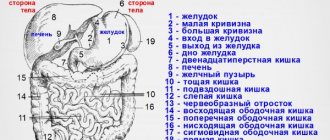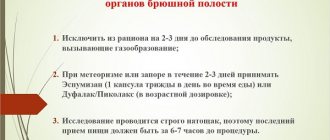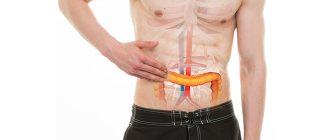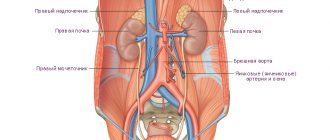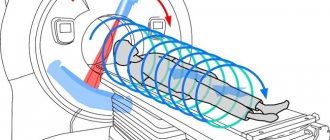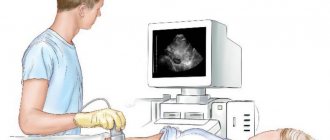How to prepare for an abdominal ultrasound?
In general, it is advisable not to eat anything 5-6 hours before the procedure. That is, it is necessary that the manipulation is carried out on an empty stomach. Experts also advise that the intestines be empty when performing the manipulation. If there are difficulties with emptying and defecation, it is necessary to drink a special tablet 12 hours before diagnosis.
How to prepare for an abdominal ultrasound:
- If, even after taking the medicine, bowel movement does not occur, then it is best to do a cleansing enema. A full bowel can significantly skew the results. Taking certain medications is also of great importance.
- The fact is that No-shpa is an antispasmodic, that is, a remedy that relieves spasms. After taking it, smooth muscles are usually relaxed. This can be identified during an ultrasound.
- You should not take aspirin or acetylsalicylic acid before the tests, as these drugs thin the blood and can cause a condition that is similar to some pathologies.
On ultrasound
Why preparation is needed
Before performing an ultrasound, you need to complete a training course.
Strict adherence to recommendations for preparation for diagnosis is necessary to eliminate a number of factors that may interfere with clearly visualizing the desired organ. This is important not only for the doctor, but the patient will have confidence that the results obtained are reliable. The study can begin only after the patient has completed all instructions, namely:
- Followed a special diet
- Didn't do any other research the day before
- Did not take medications that may interfere with the study
- Did not abuse alcohol or smoking
- Complied with fluid intake standards
Research may be hindered by:
- Spasms of the intestinal muscles resulting from previous endoscopic examination or overeating.
- Overflow of intestinal gases
- Remains of contrast agent after an x-ray
- Large fat layer on the abdomen, preventing deep penetration of ultrasound
- Wound in the examined area
- Motor activity during diagnosis
Of course, it is quite difficult to exclude some factors, but the patient can correct many of them by taking the necessary measures to eliminate them.
Is it possible to eat before an abdominal ultrasound?
Regarding food intake, it is advisable not to eat anything in the morning before the diagnosis. Ideally, you should come for diagnosis on an empty stomach.
However, there are exceptions to the rule:
- Pregnant women. The fact is that pregnant women often experience heartburn and discomfort in the stomach in case of hunger. Therefore, pregnant women are allowed to drink unsweetened tea and eat a cracker early in the morning before the procedure.
- People with diabetes can afford a modest breakfast . Indeed, in the case of this disease, a critical drop in glucose levels should not be allowed under any circumstances. It is with the help of crackers that you can increase your glucose levels.
- Children and babies. However, it is still recommended to skip one feeding and carry out the procedure approximately three and a half hours after the last meal. Of course, this can significantly affect the child's condition. Most often, diagnosis is made when the child screams very much from hunger.
Research
What medications should you take before an ultrasound?
If patients experience disorders in the gastrointestinal tract, they may need to take medications in preparation for an ultrasound. If gases often accumulate in a person’s body (he is prone to flatulence), then two to three days before the ultrasound procedure one should start taking medications that reduce gas formation in the body. These may be drugs such as Espumesan, Meteospamil, or other similar dosage forms. The doctor may also prescribe the use of sorbents - activated carbon, Polysorb, etc. Activated carbon is a completely harmless drug that is prescribed to both children and adults. But Espumezan is produced separately for adults. And Espumezan for children is available in the form of a suspension, which makes it easier to give it to both babies and older children. Before taking any medications (even regular activated carbon), you should consult your doctor. This is especially true for taking medications by young children. Parents should warn the doctor that the baby does not have an allergic reaction to the drugs themselves or to the components that make up Espumezan. And only then can the pediatrician prescribe this medicine to the child.
Diet before abdominal ultrasound
Doctors advise you to go on a typical diet 3-4 days before the upcoming examination. This does not mean that you need to severely limit yourself, or completely exclude some foods from your diet.
Diet before abdominal ultrasound:
- It is believed that legumes can cause bloating, which will significantly complicate the examination. Therefore, it is necessary to stop eating beans and peas.
- Avoid flour and confectionery products . This applies to yeast bread and buns. They contain a lot of yeast, which provoke fermentation processes in the stomach, which also causes increased gas formation.
- Eliminate milk from the menu. Fermented milk products are not included in the list, as they do not cause bloating. Mostly discomfort in the abdomen, increased gas formation is observed when drinking regular milk.
- Fried and fatty foods. These products significantly affect the condition of the pancreas and liver, increasing the load on them. Therefore, to obtain adequate and true results, you must adhere to these rules. 3 days before diagnosis, you need to go on a diet, eating exclusively stewed fruits and vegetables. Coarse fiber, in the form of fresh fruits and vegetables, should also be excluded.
- You should not drink natural juices, as they contain fiber. It is allowed to eat boiled and baked fruits. All types of proteins are included in the menu, that is, it can be meat, eggs, dairy products. Choose lean meats such as chicken and beef. Pork, lamb, and duck are excluded, since these types of meat are very fatty and can adversely affect the functioning of the liver and pancreas.
At the doctor's
Water before abdominal ultrasound
Many patients are interested in whether it is possible to drink water before an abdominal ultrasound. There are several manipulations, for example, ultrasound of the uterus or bladder, which are carried out while drinking a large amount of liquid.
Water before abdominal ultrasound:
- This is necessary to ensure that the bladder fills with water. Regarding ultrasound of the liver, as well as the pancreas and spleen, you do not need to drink water. If, along with the abdominal cavity, the kidneys and bladder are diagnosed, then fluid intake is necessary.
- The main task is to ensure that there are no gases or bubbles in the intestines that can affect the research results. After all, gas bubbles can stretch the intestines, so the doctor will not be able to adequately assess the diameter of the organ, as well as some of the subtleties of the study.
Study
Nutrition
It is recommended to eat boiled or steamed fish.
Three days before the test, it is necessary to change your diet and limit the consumption of certain foods in order to reduce gas formation in the intestines. Recommended:
- Boiled beef
- Boiled, stewed chicken
- Fish, boiled or steamed
- Eggs
- Cottage cheese
- Buckwheat and oat porridge
- Cheese
It is necessary to reduce the portion consumed and increase the frequency of meals. Don't forget to drink up to two liters of liquid.
All products that provoke increased gas formation should be excluded:
- All types of legumes
- Fruits
- Uncooked vegetables
- Flour
- Dairy
- Alcohol and carbonated drinks
Read: What does an ultrasound show for appendicitis, and how is diagnosis carried out?
On the eve of the study, you should refrain from eating heavy food for dinner, and it is better to avoid breakfast altogether. You should not use candy or chewing gum to reduce hunger.
Is an enema necessary before an abdominal ultrasound?
Is it necessary to do an enema before such a study? It is advisable that the intestines be empty. That is, so that there is no feces in the colon. But drinking a laxative or doing an enema is not necessary. It is enough to go to the toilet before the manipulation. In most cases, such a bowel movement is enough to conduct adequate examinations of the intestines and abdominal organs.
Is an enema necessary before an abdominal ultrasound?
- It is recommended to do an enema only if a person suffers from constipation, but laxatives taken orally help little. It is worth noting that it is best to carry out a cleansing enema 12 hours before the procedure.
- An abdominal ultrasound can be performed both in the morning and in the afternoon. But this does not mean at all that you cannot eat before 15:00. In this case, a light breakfast is allowed from 8:00 to 10:00 am. You can't eat later.
- Very often, before the manipulation, so that air and gas bubbles do not interfere with the study, 2 capsules of simethicone are prescribed three times a day. This is a silicone-based product that absorbs gas and removes it from the body. It is not recommended to chew chewing gum before the manipulation, as this increases the secretion of saliva and can cause the intestines to work idle.
- It is not recommended to perform an ultrasound after an x-ray or colonoscopy. If ultrasound is performed in a hospital without fail, it is necessary to warn the doctor that appropriate interventions have been carried out, such as colonoscopy and x-rays.
On ultrasound
What is ultrasound?
Ultrasound examination is a type of diagnosis using high-frequency sound waves. This kind of waves, penetrating the body, can be reflected from the internal organs. The degree of reflection with different intensities is transmitted to the monitor screen using a special sensor. When examining the abdominal organs, an ultrasound wave with a frequency of about 2.5-3.5 MHz is used.
Most often, when examining the gastrointestinal tract, abdominal ultrasound is used. Unlike conventional ultrasound, this type of diagnosis is equipped with a special convex sensor (transducer). Such a sensor makes it possible to study people who are extremely overweight, since ultrasonic rays are able to penetrate to great depths.
Using this diagnostic method, you can identify any deviations from the norm in the abdominal organs. These deviations manifest themselves in changes in organ size, structure, position, and the presence of pathological neoplasms.
An ultrasound of the abdominal cavity is performed by a sonologist. The word “sonologist” comes from another name for the ultrasound procedure – sonography.
How can a man prepare for an abdominal ultrasound?
Training for men is the same as for women. There are no special indications or rules.
How to prepare for an abdominal ultrasound in a man:
- It is recommended to eat cereals such as buckwheat, rice, and whole grain bread. It is advisable to completely avoid fatty foods and take exclusively lean meat dishes. It is not allowed to eat sausage, processed meat products, as well as smoked and salty foods.
- It is worth noting that lollipops, as well as chewing gum, can cause stomach cramps, which will affect the results. It is not recommended to smoke before the procedure. If the patient is taking any medications for treatment, it is necessary to notify the doctor, as this may affect the results and cause an incorrect diagnosis.
- Before the procedure, doctors recommend consuming foods that improve the functioning of the pancreas and stomach. That is, these are enzyme preparations, such as Mezim, Festal.
Man on ultrasound
Indications
Any pathological conditions of the gastrointestinal tract become an indication for ultrasound examination. This type of diagnosis is not the main one. Due to the anatomical location of the stomach and the low echogenicity of the organ, ultrasound is not able to provide highly accurate data. But it allows you to assess the condition and functioning of the exit sections of the gastrointestinal tract, where the main pathologies are localized.
Ultrasound diagnostics is effective in identifying inflammatory processes and functional disorders. A timely procedure helps clarify the diagnosis and prescribe the necessary treatment, reducing the risk of developing peptic ulcers and cancer.
Indications for ultrasound of the gastrointestinal tract:
- foci of inflammation in the intestines of any etiology;
- cholelithiasis;
- neuromuscular damage to the esophagus;
- portal hypertensive gastropathy;
- gastroesophageal reflux disease;
- inflammation in the duodenum and pyloric part of the stomach;
- gastritis;
- pathologies of the pancreas associated with the activity of the gastrointestinal tract.
Indications for ultrasound include all destructive processes of the gastrointestinal tract.
How to prepare for an ultrasound of the abdominal cavity and kidneys?
It is also necessary to prepare for a kidney ultrasound in a certain way. This procedure is absolutely painless and allows you to identify disturbances in the functioning of the excretory system. Typically, indications for manipulation are painful, frequent trips to the toilet, changes in urine analysis, the presence of protein, mucus or blood. Swelling in the face and legs, injury in the back. During pregnancy and chronic kidney diseases.
How to prepare for an ultrasound of the abdominal cavity and kidneys:
- Regarding preparation, it is necessary, just as before diagnosing the abdominal cavity, to limit the consumption of foods that increase gas formation. That is, these are legumes, whole milk, fatty foods, confectionery, as well as baked goods containing a large amount of yeast.
- But at the same time it is also necessary to fill the bladder. That is, the intestines should be empty and the bladder full. Only with such preparation will it be possible to obtain true results.
- This is due to the fact that ultrasonic waves must penetrate through free space and liquid and be reflected from voids. This will happen if gas and air bubbles accumulate in the intestines. Accordingly, such voids and air in the intestines can affect and distort test results. A couple of days before the procedure, it is best to take Enterosgel, as well as Smecta.
- Remember that these drugs must be taken at different times of the day so that Enterosgel does not absorb Smecta. Have dinner no later than 18:00, don’t pass it on. If you have chronic diseases of the kidneys, intestines and constipation, you must definitely do an enema or take a laxative. 1 hour before the procedure, you should drink a liter of water and not go to the toilet until you have been examined.
Is it possible to do research for children?
Preparing children for ultrasound diagnostics has several important nuances that you should always pay attention to:
- Psychology. It is necessary to talk with the child first and convince him that the procedure is absolutely safe and painless. At the same time, it is important for parents to maintain external calm.
- Shorter duration of abstinence from food (depending on age - 2-6 hours).
- Creating a comfortable environment. Parents are advised to bring toys with them to create a home environment for the child.
- Maximum courtesy and understanding from the medical staff.
Ultrasound of the abdominal cavity for a child, how to prepare?
The main task of parents before preparing young children for an ultrasound is to set them up in a positive way. The fact is that kids can be very nervous and upset, so it is necessary first of all to tell the child how the procedure will happen.
Ultrasound of the abdominal cavity for a child, how to prepare:
- Under no circumstances should you say that it won’t be scary or painful. The child simply does not hear the part no, and will be even more frightened. Just tell them that initially the doctor will lubricate the child’s skin with cold gel and run a special attachment over the tummy for 15-20 minutes.
- It is also worth preparing the child. The ideal option for an ultrasound of the baby's abdominal cavity is early in the morning. The baby will not have time to get hungry, will feel good, and will calm down. The procedure must be carried out on an empty stomach. One hour before the procedure, you should not even give water.
- The day before, one day before the examination, under no circumstances should you give your child fiber. Eliminate fresh fruits and vegetables, soda and dairy products. It is best to give your child yogurt, cottage cheese, or boiled eggs. Porridge is also suitable.
- Before starting the manipulation, early in the morning, under no circumstances give your child sweets, lollipops or chewing gum. This may cause spasm of the esophagus and stomach, which will negatively affect test results.
- If a child is prone to constipation and has not gone to the toilet for 2 days, you can give him a cleansing enema in the evening before the procedure. The main task is to set the child up and persuade him so that he does not get nervous, does not worry, and reacts calmly to the doctor’s touches.
Many interesting articles about health can be found on our website:
- Size of the prostate gland in men after 50 years of age: normal according to ultrasound
- How to do an ultrasound of the prostate gland using transrectal and transabdominal methods, why should an ultrasound be done, how to prepare for it?
- Which is better, more informative, more effective, more accurate, safer - ultrasound or MRI diagnostics: comparison.
On ultrasound
Preparation for ultrasound examination methods
Modern ultrasound examination is a procedure that allows you to assess the health of the patient’s internal organs, determine their size, identify tumors and determine other important aspects. In order for the doctor to qualitatively examine the vessels and organs located in the examined space, it is first necessary to prepare for the procedure. Proper preparation for ultrasound ensures the reliability of the diagnosis.
Preparation for ultrasound of the abdominal organs.
If a person needs to undergo an ultrasound, a mandatory step is comprehensive preparation for the procedure. The doctor will not be able to accurately determine the cause of the deterioration in your health if, during an examination of the abdominal cavity, there are gases or large accumulations of air in the intestines. In this case, the beam of the device simply will not be able to penetrate to the required depth, so it is extremely important to follow a diet and cleanse the intestines before diagnosis. Below are specific tips on how to prepare for an abdominal ultrasound.
Remember! The procedure should be carried out on an empty stomach. This means that you should not eat, drink water or drink other liquids 8-12 hours before your appointment. In response to the production of gastric juice, the gallbladder contracts and releases bile. It is pointless to examine this organ in a half-empty or empty state - its structure, contents and shape are visualized only under conditions of full filling.
· The opinions of specialists on the optimal time for the procedure vary - some gastroenterologists insist on the morning hours of examination, since this ensures the maximum interval between food intake and ultrasound. In addition, in the afternoon, due to the reflex secretion of a small amount of hydrochloric acid by the stomach, the gallbladder contracts even in the absence of the usual diet, which is the main argument in favor of morning ultrasound procedures.
· Other doctors allow the study to be carried out in the afternoon - subject to a light early breakfast and subsequent refusal to eat until the end of the manipulation.
· People who smoke should refrain from smoking cigarettes before the procedure. Nicotine can also cause partial contraction of the gallbladder.
· Before visiting a doctor, you should not chew gum - the secretion of gastric juice stimulates the contraction of the gallbladder.
· If you are taking medications, you should check the timing of the ultrasound. The ideal option is to take medications at the end of the early test procedure. Otherwise, the interval between taking medications and the examination should be at least 6–8 hours. If you are taking medications that stimulate the activity of the gastrointestinal tract, the need to take them on the eve of the ultrasound should be agreed with your doctor.
· It is prohibited to take antispasmodics and painkillers until the end of the ultrasound examination.
An ultrasound examination of the abdominal organs cannot be performed after certain diagnostic procedures (on the same day):
· Endoscopic studies (FGDS, colonoscopy) – air entering the stomach and intestines during manipulation makes it difficult to perform ultrasound and monitor the gastrointestinal tract. An ultrasound scan is allowed only 1–2 days after the examination.
· X-ray contrast studies (irrigoscopy, gastrophagia, CT or MRI with contrast) - a contrast agent, visualized on an ultrasound machine, distorts the observation picture. It takes about 2–3 days for the contrast agent to be removed, after which an ultrasound of the internal organs can be performed.
However, in such situations, doctors recommend undergoing an ultrasound examination before the procedures described above.
Diet before
ultrasound of the abdominal organs
The purpose of the diet before an ultrasound is to minimize the intensity of fermentation processes in the intestines. Air is a kind of barrier to the propagation of ultrasound, and accumulations of gases can significantly impede the transfer of accurate information to the sensor from the organ being examined.
During the diet, foods that increase gas formation should be excluded from the diet:
· vegetables and fruits;
· legumes;
· milk and fermented milk products;
· flour products and sweets (bread, muffins, cookies, candies, gingerbreads, etc.);
· fatty meat dishes;
· fatty fish;
· carbonated drinks, juices, compotes;
· alcohol.
Products allowed for consumption and forming the basis of dietary nutrition on the eve of the study:
· water-based cereal porridges (oatmeal, buckwheat, pearl barley, millet, barley, wheat, rice);
· lean meat (lean beef, chicken, turkey, rabbit);
· low-fat fish (cod, flounder, hake, pollock, haddock, sea bass, pike, river perch);
· eggs (no more than 1 piece per day);
· hard cheeses;
· boiled potatoes, beets, and carrots are allowed (if there is no individual reaction).
Of course, the above products should not be consumed fried. Nutritionists recommend steaming, boiling, stewing or baking dishes.
It is necessary to adhere to the principle of regular fractional meals - 4-5 times a day, every 3-4 hours, in small portions. Dinner should be light, preferably no later than 4 hours before going to bed.
Taking medications for abdominal ultrasound
Patients with gastrointestinal disorders often require additional drug preparation for the study.
If you are prone to flatulence, you are prescribed to take special medications that reduce gas formation (Espumizan, Meteospasmil, Spasm Simplex and their analogues) or enterosorbents (activated carbon, Enterosgel, Polysorb, Polyphepan, etc.) within 3 days before the procedure.
As an alternative, the doctor may prescribe taking enzymes (Mezim-Forte, Festal, Creon, Pancreatin) for 2-3 days before the test to degas the intestines.
Colon cleansing before abdominal ultrasound
If the patient has irregular bowel movements or chronic constipation, complete bowel movements must be achieved before the ultrasound examination.
· For constipation, it is recommended to take a laxative on the eve of the ultrasound (laxative, Guttalax, Fitolax, etc.) or use suppositories to facilitate bowel movements (Glycerax, Bisacodyl, glycerin suppositories, etc.).
· The use of intensive bowel cleansing drugs such as Fortrans and Endofalk before ultrasound procedures is not recommended by doctors.
· As an alternative to laxatives, an enema is sometimes used (for example, if it was not possible to fully empty the intestines in the morning) with 1–1.5 liters of water at room temperature.
Forced bowel cleansing is not at all necessary if the person being examined has regular bowel movements - in this case, natural bowel movements are sufficient.
Preparation for ultrasound of the kidneys, bladder and adrenal glands.
In addition to the diet, you need to drink water immediately an hour before the test. You need to drink about half a liter of plain still water or unsweetened tea, then do not urinate.
It will be best if you arrive 40 minutes before the appointed time with a container of still water and drink it slowly. As soon as you feel a little urge to go to the toilet, it’s time to do some research.
Preparing for a prostate ultrasound
Performing an ultrasound of the prostate requires preparation, which depends on the chosen technique; transabdominal and transrectal ultrasound are most often prescribed.
Transabdominal
Diagnosis is carried out with a full bladder. For about three to four days, it is important to exclude foods that cause flatulence and bloating: fresh fruits and vegetables, brown bread, legumes. It is prohibited to consume alcoholic beverages, soda, and canned fruit juices. Due to gas formation in the intestines, the image may not be clear.
The scan is carried out on an empty stomach, so breakfast is canceled, but if the examination is scheduled in the afternoon, a light snack is not prohibited.
The examination is carried out with a full bladder; for this, the patient needs to drink a certain amount of liquid, the volume of which depends on the purposes of the ultrasound. If an ultrasound is prescribed due to infertility or sexual dysfunction, drinking 3-4 glasses of water is enough. They drink water 2-3 hours before going to the toilet.
If urinary problems are diagnosed, the patient must drink water half an hour before the procedure right in the clinic. The volume of water is at least 1 liter. Scanning begins at the first urge to urinate.
Transrectal
diagnosis requires more thorough preparation for prostate ultrasound. The main condition is a clean intestine, the absence of feces in it, this reduces the discomfort of the procedure for the patient and gives a more informative picture.
To cleanse the intestines, you can use the laxative “Fortrans”. This product was created specifically for such medical procedures. To cleanse the intestines you will need 3-4 packets of laxative, drink it on the day of the procedure, 1 packet per 1 liter of water. If the ultrasound is performed in the afternoon, 2 sachets are drunk in the morning.
You can also cleanse the intestines with an enema, 2-3 hours before the test. Usually 200-300 g is used. warm, or 1.5 l. cold water. Your doctor will tell you how to carry out the procedure correctly. To cleanse the intestines, you can use pharmaceutical microenemas or a glycerin suppository.
Doctors have different opinions regarding the fullness of the bladder before this type of examination. Some believe that the bladder should be empty, others believe that you should drink water before the examination. This issue should be discussed with the doctor performing the ultrasound.
Preparation for TRUS of the prostate consists of following certain dietary recommendations. Alcohol, fruits and vegetables that promote gas formation are excluded from the patient’s diet; the menu must include boiled chicken, vegetable purees, soup, and liquid porridges. The last meal should not be later than 18 hours.
About two hours after dinner, take activated carbon at the rate of 1 tablet per 10 kg. In addition to coal, it is possible to take stronger drugs, such as Polysorb, but only strictly according to the instructions.
You are not allowed to have breakfast in the morning; you are only allowed to drink water.
Preparing for an ultrasound of the thyroid gland
No special preparation is required for thyroid ultrasound.
The patient must provide access to the neck area for examination. Clothing should be comfortable and not interfere with manipulation. You should not wear jewelry that covers the neck area.
Preparing for breast ultrasound
To perform an ultrasound of the mammary glands, no preparation is needed. Experts recommend conducting the study from the 5th to the 14th day of the menstrual cycle.
Ultrasound doctor E.M. Batyrshina
